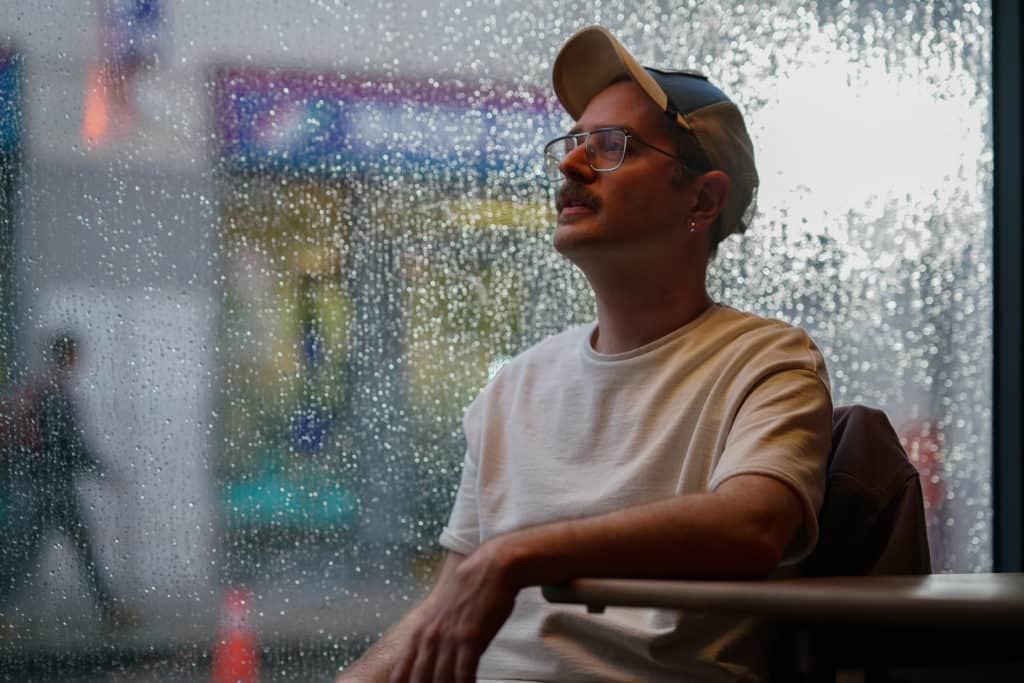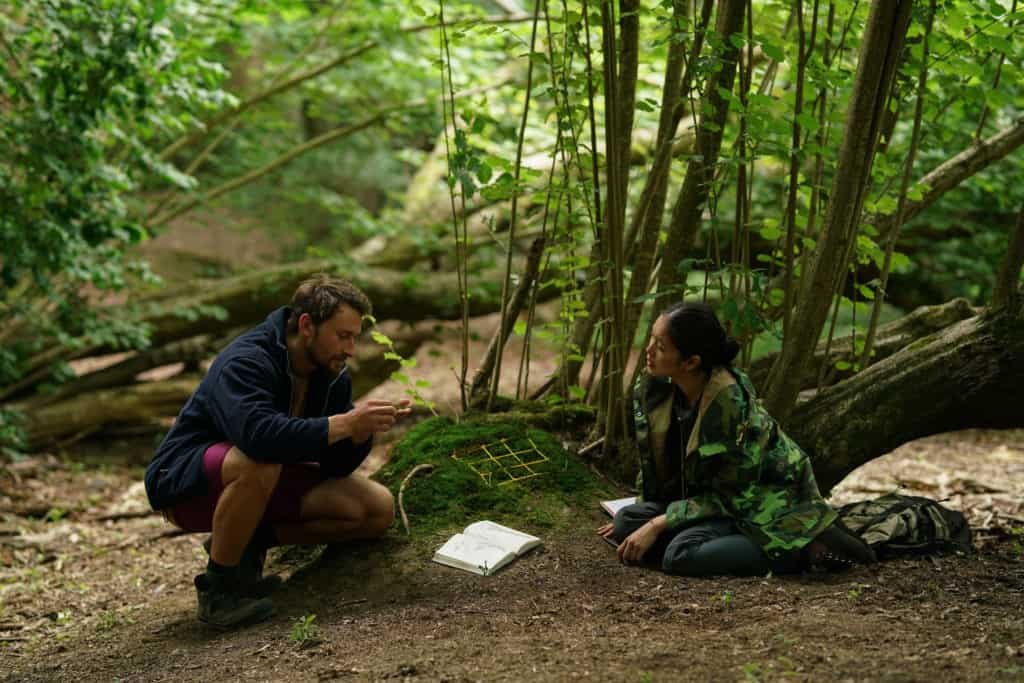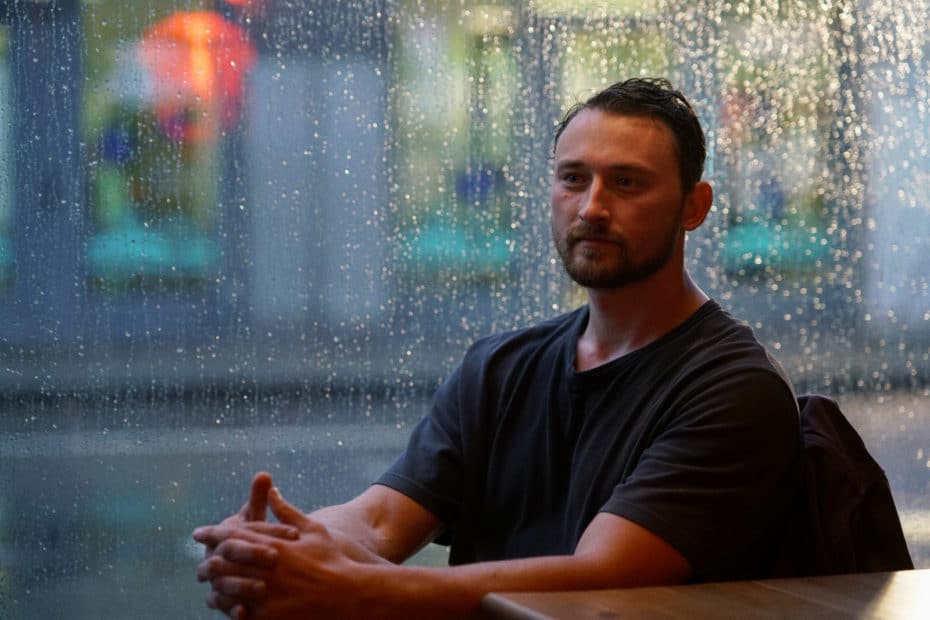Here by Bas Devos (reviewed here) was presented in the Encounters section of the 2023 Berlinale, and it ended up winning the first prize. I had the opportunity to talk to Devos and briefly with the male lead of the film, Stefan Gota, as well.
Yet another, So May We Start? Let’s Start from Here
If we go the usual route and talk about the origin of the project, how did it start?
Bas Devos: It started with Stefan. I met him quite a while ago, and he had smaller parts in my two previous films, as well. In Ghost Tropic, he played the security guard at the beginning of the film. During the shooting, I felt that I would like to do something with Stefan, but I didn’t know what. Then I started thinking about labour migration and the large influx of Romanian workers in Belgium since 2014 (When the labour market opened for Romanians and Bulgarians). That changed everything since you can take a plane on Friday night to go back.
Like they say in the film, “probably with Ryanair”.
B.D Yes, exactly. Mobility has changed so much. We spoke to people who went to Turkey or wherever, and they had to stay there. Now, you can take a flight back on Friday and fly to Brussels again on Sunday night, which lots of them do. The connection to a place becomes more fluid or fragile. At the same time, I started to get more interested in nature and moss. There is such beautiful attention necessary to be able to perceive it. You have to get down on your knees. You have to get close to it.
Sometimes it could be too close, like the line in the film, “Now you are too close”.
BD: Yes, (laughing)

Prénom Bas
When we are introduced to Shuxiu, she talks about losing the language and naming things and how things don’t exist until they have names. That could relate to a foreigner’s experience with a new language, but here it is rather about language as such, right?
Yes, there are those two conflicting ideas. On the one hand, in order to engage in relationships with things, we need to know their names. If we know all the names, how does that change our view of them, like the moss, for instance? Do we move through the forest differently if we know the names of everything? On the other hand, it points to our limits of thinking as human beings that we have to name things and separate them from ourselves.
But in her case, it’s essential since she is an academic. She has to name things.
Absolutely, she has to name things, but it must be a dream or a fantasy of hers to let go of this from time to time and to feel connected with the world. This is an idea I picked up in a book by a famous biologist called Robin Wall Kimmerer. Her book is called Gathering Moss, in which she beautifully speaks about the particular nature of naming things. At the same time, she brings a background (she is native American) which is deeply spiritual and deeply rooted in connection to the land, and it’s very beautiful to see these two voices within the same person. So, the film is a reflection on things she articulated very well.
Yes, because the film is, in a way, about people’s relationship to nature or maybe to acknowledge the presence of nature.
What was important for us was the fact that nature is always present, and there is a lot of nature we don’t see. Like moss, for instance, once you see it, you can’t unsee it, but before that, it’s virtually invisible. I discovered that myself, and I found it really triggering and beautiful. To suddenly look at your surroundings with a different perspective. Hopefully, that also resonates through the film.
So, when you say “look at”, that brings us to the cinematography. How did you approach the film from that point of view?
We were thinking a lot about the micro versus the macro world and how the whole film, at least at the beginning, if we talk about the conversations, they are relatively “cheap”.
Or mundane, at least
Yes, mundane. The film is a long zoom-in that begins at the building site and ends up at the tiniest of moss. We spent a considerable amount of time thinking about the contrast between being close and then wide to always emphasise the space between the human and the surrounding.
Through edits rather than zooming.
Yes, not through zooming, but to elaborate on an approach that feels comfortable to me, the DOP (Grimm Vandekerckhove), and the production designer.

And then the cinephile thing that people like me love to talk about; Do you have any particular directors that influenced your style?
I get that question quite often. There are many filmmakers that influence me, but when I make a film, I never try to have direct influences.
I thought that maybe in hindsight, you would notice influences, or maybe that’s what critics do.
Yes, that’s your task.
When it comes to Ghost Tropic, for instance, I thought a lot about Akerman and Toute une nuit, but she is one of my favourite directors, so I think about her all the time.
Sure, her films, but today, maybe more the films of Kelly Reichardt. But to connect my films to a particular director is difficult. It’s so fluid; it’s rather a kind of kinship and me hoping they would feel the same way about me.
So, Stefan, how did you approach the part?
It was Bas who led me towards something I didn’t know would be my part. We were doing interviews and met some Romanian seasonal construction workers, and we were struck by the fact that they gladly shared their stories, but it was always something they were withholding. I think that’s true about my character as well. He is dwelling on whether he should stay or go back. We built the character slowly, and during the first two weeks of shooting, we felt the rhythm more and more.
Were there lots of rehearsals before the shooting started?
We had some, especially the key scenes of dialogue between Liyo and me. Not a lot, but some.
Bas Devos: It’s also about finding the dialogue to change it and see how it works better. That’s why I like rehearsals a lot.
